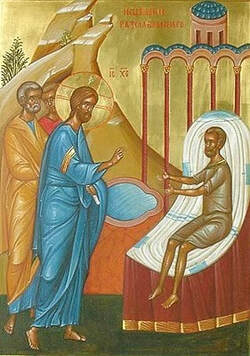 How do you feel about the situation in which we currently find ourselves? Listening to the news, social media and socially distanced individuals I have heard and read extremes of opinion; for some, bliss. Whilst for others, a living hell! We do not like to be victims of problems we cannot solve. Whether it is a health-related issue, a damaged relationship or a combination of complex issues of which we have no control. Few of us cope well in such situations. How would you feel if you felt despondent for your past and hopeless for your future? How must the paralysed man in todays gospel reading have felt? He had been paralysed for 38 years. We do not know his age but, as the length of his condition is reported, I think we can assume that this was not something he had experienced from birth. I think we can also assume that for many years this man had been coming to the pool waiting and hoping to be healed. He had seen others delivered and healed each year. Whilst he, bound by his infirmity, continued to suffer. Did this man feel dragged down by his infirmity? Did he fall back in despair and despondency? Did this man feel anger that in all the time he had been waiting to enter the pool, not a single person had shown compassion on him and helped him into the pool? Not at all! St John Chrysostom teaches us; “Great is the profit of the divine scriptures, and all sufficient is the aid which comes from them…for the divine oracles are a treasury of all manner of medicines….in the Scriptures we may find abundant resource. Perhaps, the most efficacious of all the remedies to be found in the Holy Scriptures is humility! Notice the humility of the paralysed man, this man wanting so much to be healed. When Christ asks him if he wants to be healed, he doesn’t just say ‘yes’, but humbly says “I have no one to put me into the pool…”. The man showed no particular evidence of faith. There is nothing to suggest he was waiting for Jesus. And yet our Lord, filled with compassion, heals him. We do not know if the paralysed man had faith or not; whether he was a good person or not. What we do know is that he demonstrated humility. The UK has a rich history of preventing ill health and has led the way globally. Edward Jenner developed the first smallpox vaccine in 1796. The link between contaminated water and cholera was identified using data analytics in England in 1854. Penicillin was discovered by Sir Alexander Fleming in 1928. British scientists led the medical science and built the evidence base to establish the link between smoking and cancer during the 1950s. In 2007 it became illegal in England to smoke in enclosed public spaces. In 2015 we became one of the first countries to introduce a national publicly- funded vaccination programme to protect children against meningitis type B. Now we have ‘social distancing’ and self-isolation to combat Covid-19 (Coronavirus). We all know that prevention is better than cure. And we see this principle being applied in our Lords encounter with the formerly paralysed man when they meet again in the temple. ‘14 Afterward Jesus found him in the temple, and said to him, “See, you have been made well. Sin no more, lest a worse thing come upon you.” Why did Jesus say this? Was the man paralysed because of some historical sin? Probably not. Rather, I think, Jesus is pulling together the spiritual and physical. Jesus is saying that sin causes something far worse than physical paralysis. We may ask, what could possibly be worse than being physically paralysed? Sin causes spiritual paralysis and separation from God. This is indeed worse than any physical illness. We live in a world focused primarily on physical appearance and health. A world where many are oblivious to spiritual illness. Just as we are able to feel the pain and discomfort of physical injury, we also need to learn to feel the spiritual pain of our sins. We sprain our ankle and immediately feel the pain. But what do we feel if we slander someone? Jesus Christ, ‘Physician of soul and body’, asks each of us, weak and sinful as we are, the same question that he asked the paralysed man; “Do you want to be made well?” If we do, then let us rise up to a life of holiness. Let us open ‘the divine oracles’ (Holy Scriptures) knowing that they are ‘a treasury of all manner of medicines’. When we are permitted let us receive Holy Communion, for the healing of body and soul. And let us not forget Confession, the forgotten medicine. We can respond to our Lord’s question in the sure and certain knowledge that He can heal physical and spiritual illness, not only because He overcame sin, but because He also overcame the ultimate consequence of sin – death itself! Christ is Risen! Father Julian
0 Comments
Leave a Reply. |
Parish Blog
This mainly contains homilies and messages from our priests, although there is some scope to share thoughts and interesting articles which we may want to share with others Archives
October 2022
Categories |
 RSS Feed
RSS Feed